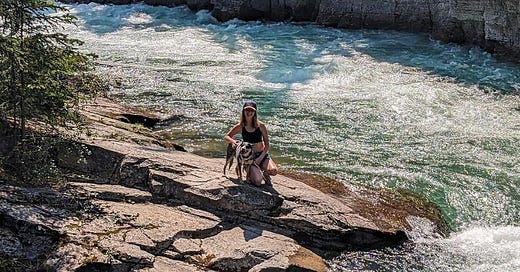Should we compare domestic dogs to wild animals?
Yes and no. Nuance abounds! Here’s my take as a nerdy dog owner.
Where did this question come from?
A while back a dog trainer reviewed an article I wrote for a pet publication. They suggested removing a reference I’d made to our dogs’ canine ancestors out of concern it would encourage readers to see their companions more as wolves than dogs (and possibly perpetuate old-school training myths).
I accepted the feedback and made changes for the audience at hand. But the experience got me thinking.
Equating our companions with wolves can definitely be harmful. But there are also plenty of times where it’s helpful to pull out similarities between Scout and her ancient relatives. When does it work? When does it fall short? What (often unfair) misconceptions do we have about wild animals that fundamentally skew these comparisons in the first place?
When comparing my pet dog to a wild animal is helpful
Honoring Scout as a canine—not a cute, furry little human—has been a vital part of my dog ownership. Comparing the sweet, docile heeler at my feet to a wild animal helps me:
Better understand her innate instincts (especially predatory behavior)
Scout has a strong desire to chase small critters. She likes to scavenge for things. She’s desperate to know all the details of her surroundings. I can’t personally relate to many of her urges… but they make perfect sense for a canine.
While we have to train certain habits to successfully navigate the world around us, I don’t begrudge her natural tendencies. I set realistic expectations!
Respect traits that are deeply rooted in years of evolution (outside an anthropocentric environment)
Humans and dogs have coevolved since our species first connected all those generations ago. But canines and primates still have very different family trees with diverging histories!
While I’m a huge proponent of acknowledging the special relationship between people and domestic dogs, I also think we’d do well to remember they don’t come equipped with an understanding of our social norms—or an automatic comfort with all the weird stuff we do.
And that doesn’t make them “bad”!
Which leads right into…
Give my dog the right to have preferences and natural reactions
Sometimes I feel like we’re better at this with “wild” creatures than we are with our pets. If someone startles a predator out in nature and gets injured? We don’t blame the animal. We understand where they’re coming from. Yet we often act like our pets should be perfect robots who tolerate everything all the time.
Ultimately be more fair to my companion
Basically: Trying to understand the canid ancestors Scout descended from helps me be more empathetic, thoughtful, and ultimately fair. This is especially important in our modern world where lots of daily situations can be overwhelming to our pets.
When comparing my pet dog to a wild animal is unproductive
It’s important to stay grounded in the reality that Scout is not actually a wolf, or a coyote, or a fox, or any other canine relative (past or present). She’s a domestic dog. And that makes her pretty unique in the animal world!
Equating my heeler with a wild creature can cause harm if I:
Miss the special nature of the dog-human bond
Make no mistake: Wolves and wolf ancestors are awesome. But I think domestic dogs are even cooler. (No doubt because I actually live with one.)
One example: Dogs might respond more readily to cues from us humans than from their own species. In Dog is Love, Clive Wynne summarizes multiple experiments that have sought to test the bond between people and their dogs along with the ways wolves have compared when put into the same setups.
I don’t want to reduce Scout to a wild creature and close myself off from the very real, honed-over-generations bond people can have with our pets.
Get caught up in old-school myths
Old-school dog training methodologies that rely on “being the alpha” or always “asserting dominance” over our pets are problematic for a number of reasons.
For one thing, they’re based on an inaccurate idea of modern wolves in the first place. For another, modern wolves are not the same as their old common ancestor with our domestic dogs. And as mentioned above, dogs are quite different than wild canines.
If someone associates wolves with lots of physical coercion and aggressive displays… yeah, I see the danger in making too many direct comparisons.
Feel like just because something is “natural” it’s automatically best
Just because my dog can be outside in cold temperatures without lasting physical harm doesn’t mean she should. Just because wolves don’t ever wear jackets or other clothes doesn’t mean she shouldn’t. Just because it’s not uncommon for a wild animal to experience hunger, or physical altercations, or so on doesn’t mean I shouldn’t try to protect my companion from those things.
If we get too caught up in seeing our dogs as wild, we can forget that the “natural way” of the world isn’t always the ideal one when we have the power to intervene.
Domestic dogs aren’t wild—but they also aren’t little humans
Like just about everything in pet ownership and life overall, I think it’s about finding a balance. Domestic dogs aren’t modern-day wild animals. Our pets are also not people. And we can hold multiple truths at once! We can make analogies when they’re helpful without completely losing ourselves in them.
Related reading:










